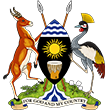![]()
History and Political Situation
Uganda developed from the nineteenth century kingdom of Buganda, based along the northern shore of Lake Victoria.
In 1894, Uganda became a protectorate of the British Empire, though the country was never fully colonised. Self-government through a Legislative and Executive Council led to full independence on 9th October 1962.
Milton Obote, leader of the Uganda People's Congress (UPC), was elected Prime Minister. He was overthrown in 1971 by Army Chief of Staff, General Idi Amin, who established a brutal dictatorship. The Asian Community was expelled in 1972 and intellectuals persecuted. Border tension led to an invasion by Tanzania, with support from exiled members of the Ugandan National Liberation Front (UNLF). President Amin was over-thrown and ill-organised elections in 1980 returned Obote's UPC to power.
President Obote's government relied on the support of the army and soon became embroiled in a savage guerrilla war against Mr. Yoweri Museveni's National Resistance Army (NRA), who regarded Obote and his supporters as criminals. Growing dissence between the Acholi and the Langi factions within the army resulted in Obote's overthrow by the Acholi, led by General Tito Okello Lutwa. Gen. Okello established a military council, but after a bitter battle in January 1986, the NRA occupied Kampala and Mr. Museveni was installed as President.

